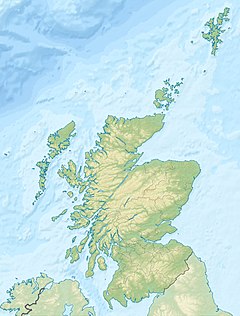Ardtornish
| Ardtornish | |
|---|---|
|
|
|
| OS grid reference | NM700475 |
| Coordinates | 56°32′47″N 5°44′05″W / 56.54638°N 5.73481°WCoordinates: 56°32′47″N 5°44′05″W / 56.54638°N 5.73481°W |
Ardtornish (Scottish Gaelic: Àird Tòirinis) is a Highland estate in Scotland located in Morvern, Lochaber. Ardtornish House is famous for its gardens and the estate is the location of the ruined Ardtornish Castle and the still-inhabited Kinlochaline Castle.
In the mid-18th century the area occupied by the current estate was largely in the hands of Cameron of Glendessary, with some property to the east and south the lands of MacLean of Kingairloch and the Duke of Argyll. A small area near the head of Loch Aline was owned by Murray of Stanhope. By 1800 Cameron's lands were under the control of a variety of new superiors including MacLean of Inverscaddle, MacDonald of Borrodale and MacLachlan of Callart with Stanhope's land also being held by MacLachlan.
By 1850 radical changes had occurred. In 1845 MacDonald's land to the east of Loch Aline had become the 9,000 acres (3,600 ha) Achranich Estate owned by Octavius Smith, a Londoner whose father had made his money in grocery wholesaling and who was himself a successful distiller. To the west, part of Argyll's substantial holdings had been broken up with John Sinclair owning the Lochaline Estate and in the east Argyll's land was in the hands of the notorious Patrick Sellar, who had also purchased the holdings of MacLean and MacLachlan in 1844, which he named the Ardtornish Estate after the pre-existing castle.
At Whitsun 1860 Smith purchased Sellar's lands and immediately renamed the whole estate "Ardtornish", the name meaning "The headland of Thorir's (or Thora's) promontory". The clearances had by this time affected Morvern - over 3,200 left the parish in the 19th century, 750 of them forcibly evicted - and the bitter memories of the actions of Sellar and his neighbours lived long in the area. Ardtornish, however, seemed to strike a favourable chord with those fortunate enough to be entertained by the estate. Tennyson who missed the opportunity to visit Skye whilst staying there wrote:
...
Wikipedia

